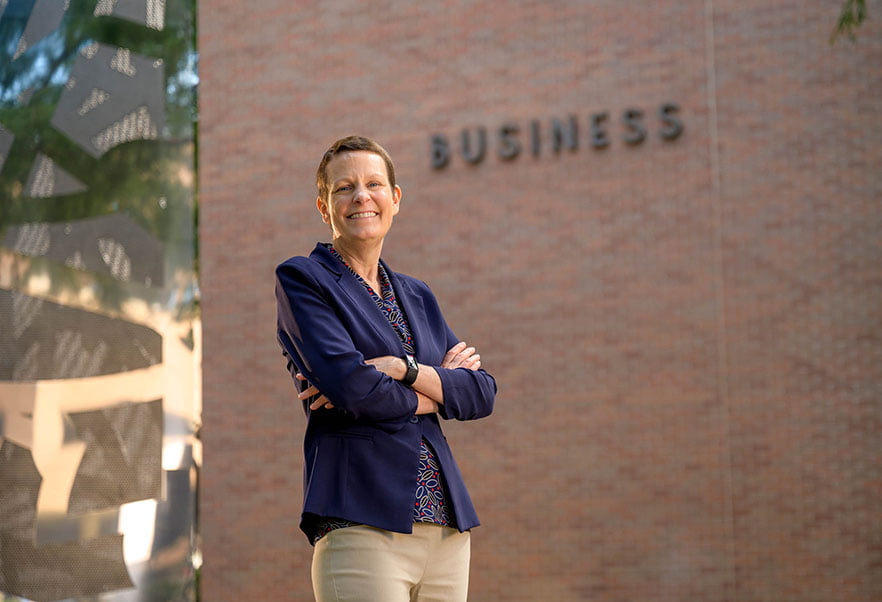Cancer fighter
Wendy Casper remembers the date without hesitation: Sept. 28, 2018.
Just two weeks before, Casper, an expert in organizational behavior at The University of Texas at Arlington, had a routine annual mammogram. A suspicious finding led to a biopsy, and the results came in that fateful day: breast cancer. The longtime management professor had just been named associate dean for research in UTA’s College of Business.
“When they called me back for additional screening, I never thought I would actually have cancer,” Casper said. “I was shocked when I received the diagnosis.”
 Wendy Casper
Wendy CasperCasper had HER2-positive breast cancer, a rapid-growing type.
Now, on the anniversary of her initial diagnosis and after a full year of targeted therapy, five months of chemotherapy, surgery and radiation, Casper’s prognosis is good.
“I am lucky,” Casper said. “There have been major advances in treatment for HER2-positive breast cancer. This targeted therapy is very effective with fewer side effects.”
She said her colleagues in the College of Business—from Dean Harry Dombroski to colleagues she works with daily to students who saw her lose her hair because of the treatment—were pillars of support.
Casper holds the Peggy E. Swanson Endowed Chair at UTA and was named a fellow of the Society for Industrial and Organizational Psychology in 2016 for her prolific research on work-family issues. Her research includes work-life issues, diversity and cross-cultural issues, training and career development and recruitment.
She said her experience with cancer has sparked new research ideas.
“This experience really made me aware of a new work-life balance issue I had yet to study: how cancer patients handle work during treatment and what their employers can do to help,” Casper said. “I feel incredibly grateful to be here… to be able to start to incorporate work-life balance and cancer treatment into what I study as a researcher.”
After her diagnosis, Casper refused to yield to a feeling of despair. Instead, she educated herself about breast cancer. She wanted to know everything about the disease. She talked to colleagues across campus, friends who had been through breast cancer and family members about the diagnosis.
Casper credits her outstanding medical care at UT Southwestern and support from the UTA community for enabling her to stay engaged with her work during treatment. She sang high praises of her medical team—Dr. Marilyn Leitch, the S.T. Harris Family Distinguished Chair in Breast Surgery; and Dr. Barbara Haley, the Charles Cameron Sprague, M.D., Chair in Clinical Oncology.
“The news made us cherish each other even more,” said her husband, Roger Duval. “It heightens your love for each other. Wendy has been a rock in this whole process.”
Casper had no family ties to cancer, no noticeable lump or other symptoms, no indications of trouble on previous mammograms and no other signs that cancer would strike.
“A mammogram saved my life” Casper said. “When I think about what could have happened if I had put off my mammogram—every day I am grateful I did not.”
See Casper’s video that UT Southwestern filmed.